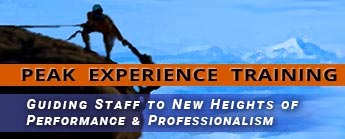ONSITE CLINICAL FIRST AID™ SYLLABUS - 3-DAY
DAY 1
- Community Building
- Resilience
- LUNCH
- Scenario
- Adventure Facilitation
- Goals of Misbehavior
- Boundaries & Ethics
DAY 2
- Cultivating A Healthy Relationship
- Human Development
- LUNCH
- Suicidality & Self Harm
- Communication Lab
- Scenario
DAY 3
- Group Dynamics & Facilitation
- Scenario
- LUNCH
- Anger Cycle
- De-escalation
- Burnout & Self Care
- Closing
ONSITE CFA - Expanded Course Descriptions
Community Building: At the outset of the course, participants engage in a series of adventure initiatives designed to create the container and establish the emotional safety necessary for participants to engage fully with each other and prepare to enter into an experience that will foster both professional and personal, growth. Course material is introduced and individual and group goals are established.
Resilience: The critical role of resilience to mental health will be explored through various models and tools to promote self-regulation. These skills can be applied for self-care and in working with students to foster resilience and overall stability in emotions and behaviors. Drawing from the neurobiology of trauma and nervous system resilience, guides are taught the Hand Model of the Brain and how moving into “fight-flight-freeze” takes someone out of their “Resilient Zone” and into a place of heightened reactivity that can be disruptive for a group.
Adventure Facilitation/Community building: At the outset of the course, participants engage in a series of adventure initiatives designed to create the container and establish the emotional safety necessary for participants to engage fully with each other and prepare to enter into an experience that will foster both professional and personal, growth. In addition, the facilitation process is explored through the experiential learning model and exposure to seven generations of “giftwrapping.” Course material is introduced and both individual, and group goals, are established.
Goals of Misbehavior: Based on the seminal work of Rudolph and Dreikers, the goals of client misbehavior are explored to determine the underlying needs that the client is trying to meet. Particular emphasis is placed on the guide’s internal process and how this information can be utilized to help staff better understand students and intervene more effectively.
Boundaries & Ethics: Through a series of experiential activities, participants are engaged in exploring the unique aspects of physical and emotional boundary issues that are inherent in an outdoor or residential environment where staff are living collectively with students and participating together in the tasks of daily living.
Discussion focuses around such critical boundary-related issues as the pros and cons of self-disclosure, dual roles, maintaining contact post graduation, and scope of practice. The scenario that follows is designed to illustrate the complexities of these issues.
Cultivating Healthy Relationships: Based on the work of Scott Miller and the Solution Focused Therapy School, a simple and straightforward approach to engaging students and creating emotional safety is presented. Participants are offered concrete tools for meeting clients where they are.
Human Development and the relationship to behavior: In this foundational piece, participants are introduced to the developmental tasks of adolescence, along with stages of cognitive development and psychosocial development. The focus is on the development of personality and sense of self in relationship to the environment/significant others’ differently through the life span (emphasizing birth through adolescence). We also highlight how disruptions in development at each stage lead to different developmentally related issues, as well as different needs that may underlie similar behavior.
Suicidality, Self Injury & Crisis Intervention: Suicide is presented as a behavior on the continuum of self destructive behaviors. Other self harming behaviors are discussed as well, including possible functions they might serve for students. The main focus of this session is to help participants feel equipped to competently deal with a suicidal client. Demonstration and role play are utilized to consolidate this learning.
Communication Skills Lab: In this playful program, participants learn about “communication quandaries” and the four places shared meaning can be lost in communication. Emphasizing the importance of active listening, participants engage in a series of fun activities that illustrate effective communication and that can be easily employed with any group.
Group Dynamics & Facilitation: A theoretical overview of group dynamics and different types of group facilitation is presented. Afterwards, an extended scenario of a daily group is conducted, with each participant having the opportunity to to co-lead the group.
Anger Cycle: Participants are introduced to a unique anger management tool that offers clients more choice when exploring their anger process.
De-escalation: Building upon the foundational principal of the Clinical First Responder Training, de-escalation is explored through a relationship lens. Focusing on emotional thresholds and the process of escalation, a crisis model is applied to guide interventions. Tools are introduced to leverage the relationship including mirroring and matching, “rescue” techniques and grounding and centering.
Burnout- Self Care: An exploration of causes of burnout, signs of burn-out in self and colleagues, and practical steps that can be taken both in and out of the field/workplace to avoid burn-out. Self-care strategies are discussed and participants are invited to complete a personal self-care plan.
Note:
At this time, CFA courses are being offered per request on a contractual basis.
We partner with organizations to provide the training for the contracted organization in your locale.
Programs often collaborate with other organizations in the area to boost participation and share costs.
Organizations interested in an onsite training could elect to have the asynchronous material presented live which would result in a 3-day training.
Please contact us for rates.
